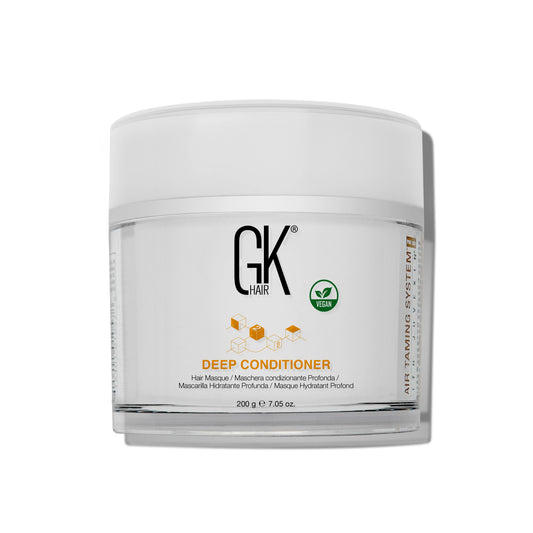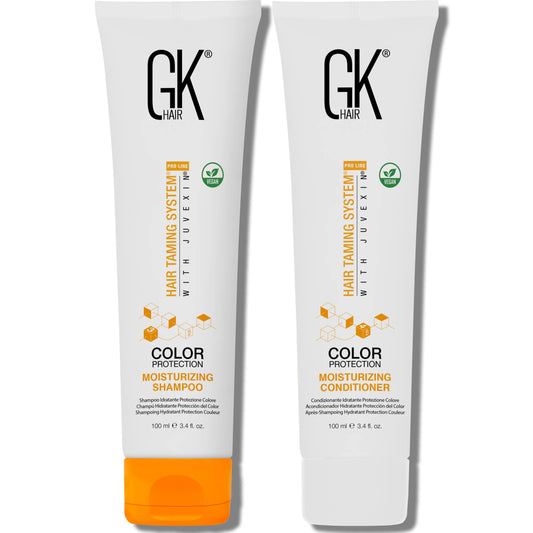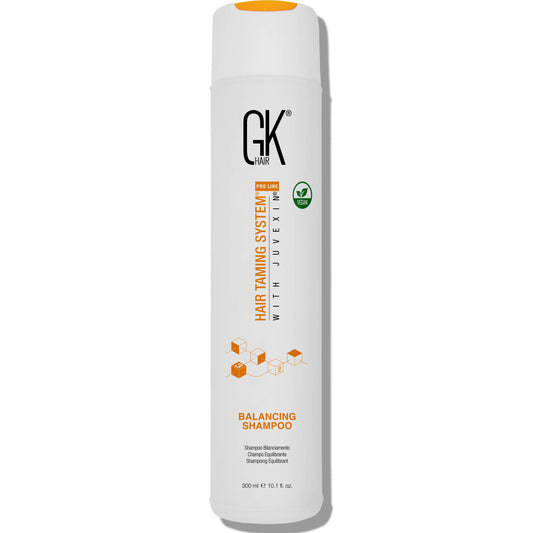We've all experienced damaged hair at some point. The frizz, split ends, breakage, poor shine, dryness is a common experience and primary symptoms of damage. In dealing with damaged hair, there's the dilemma of deciding the best hair repair treatment. We know how it feels to make this seemingly tough decision. But with GK Hair at your beck and call you can repair damaged hair and your hair would be better off than it was. Ahead, we've provided specific products for specific functions. You would also find the right tips to reviving your hair and what not to do and use.
GK Hair's Best Selling Products for Damaged Hair Repair
All of GK Hair products are formulated with natural ingredients that:
-
Offer nourishment
-
Offer hydration
-
Protect from heat, climate and color fading
-
Strengthen keratin/protein bonds
-
Reduce flaking and dandruff
And yes, you are at the right place to find a solution once and for all to repair your damaged hair. Here are a few of our best hair repair products to not miss out on:
Moisturizing Shampoo and Conditioner
This duo offers manageability to hair alongside washing and transforming dry and brittle hair to soft and smoother tresses. Go with GK Hair Moisturizing Shampoo and Conditioner for a sure combination for taming frizz and unruly strands.
Deep Conditioning Hair Treatment
Your hair can receive deep nourishment for the whole day, tackling dryness and providing shine with GK Hair Deep Conditioner. It's formulated with natural jojoba seed oil - known for offering deep hydration.

VolumizeHer Spray
Get extra volume and texture from our VolumizeHer Spray. Its uniqueness is that it offers a light yet long-lasting hold for the entire day.
Nanoplastia Treatment: A Bond Builder for Damaged Hair Repair
Bond builders are exactly what they sound like—they help repair the broken bonds in your hair. What happens when hair bonds are broken? You'll notice split ends and breakage. You can easily take control of these woes when you take advantage of bond builders and how they are making treatments easier. If you go out on the search for a bond builder, you may not easily get one. Lucky for you though, bond builders are part of the formulas of many hair products on GK Hair Collections.
What is our recommendation? Nanoplastia Hair Treatment. It contains ingredients that fortify the natural bonds of your hair.
For the best usage:
-
Cleanse hair with a clarifying shampoo. The moisturizing shampoo washes as well as open up cuticle for the absorption of the nanoplastia treatment
-
Blow dry hair to about 90% with GK Hair Feather Light Blow Dryer
-
Divide the hair into 4 equal sections
-
Apply the nanoplastia treatment with a vent or GK Hair Extra Round Hair Brush
-
Rinse out with a hair repair shampoo like GK Hair Balancing Shampoo for oily hair.
Tips for Reviving Your Damaged Hair
Some of the signs of damaged hair are obvious, while some are not. Regardless, our hair repair products offer visible improvements with daily and occasional routine. In no time, you'll notice improved shine and hydration with these tips:
Daily Tips for Healthier Strands
Choose Nourishing Hair Treatments
Damaged hair requires reparative nourishments to revive it while being sustained with care. Infused with Juvexin, our shampoos, conditioners, creams, oil and sprays have been developed essentially for smoother, stronger and healthier hair.
Limit Heat Styling and/or Use Protectant
Heat styling tools aren't all that bad. However, prolonged and continuous use of them can slow down the progress of your hair. They should be used sparingly if to be used at all. For your next hair styling procedure, start by selecting the right hair styling tools from GK Hair Tools Collection. Your hair can't go bad when you choose the right tools, the right products and go with the appropriate usage.
Stick to a Routine With a Weekly Hair Treatment
A major step to your transformation you must take heed to is a routine. You can never go wrong in reviving your hair with a weekly hair treatment that accommodates any hair care goal you are aiming at.
Sleep on a Silk Pillowcase
Rough fabrics—such as cotton—pull on strands causing friction and in the long run, breakage and frizzy strands.
Occasional Routine for Healthier Hair
Many people assume that repairing hair damage is solely the job or responsibility of a hair repair shampoo. Not so! Go a step further by incorporating these occasional routines in dealing with unruly and damaged strands.
Use a Hair Repair Mask
After a regular deep conditioner or leave-in conditioner treatment, you need the hair repair masque. They offer deep hydration while taming curls, waves and protecting blondes. Add Ultra Blonde Bombshell Masque to your blondes for more definition and protection. GK Hair Hot Bombshell Masque can be applied to damp hair and hair ends alone. Follow this with a thorough rinsing after a few minutes.
Go for Trims
Your hair needs intermittent trimming, say after 2-4 weeks. This helps to trim out split ends and recover hair growth. You could opt for a DIY trimming with a large mirror in front of you or go to a salon.
Incorporate Scalp Treatment
Once in a while, your hair can enjoy a booster from a scalp treatment.
If you are yet to put a name for the symptoms you are experiencing, take the quiz for personalized recommendations and solutions.














Leave a comment